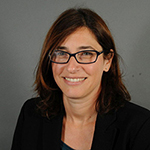Eight HDFS faculty and four HDFS graduate students will be presenting 12 posters at the Society of Behavioral Medicine (SBM) in San Francisco, CA at the end of March! See them all here
Author: Janice Berriault
Na Zhang led mindfulness workshop for students at UConn Stamford
 Assistant Professor Na Zhang recently organized a mindfulness workshop at UConn Stamford. She led students in meditation and discussed how to work with stress and improve quality of attention. Na plans to have one or two more of these workshops this semester.
Assistant Professor Na Zhang recently organized a mindfulness workshop at UConn Stamford. She led students in meditation and discussed how to work with stress and improve quality of attention. Na plans to have one or two more of these workshops this semester.
Jennifer Dealy (PhD ’19) now Assoc Prof at Albertus Magnus College
 Jennifer Dealy (PhD ’19) was recently promoted and tenured as associate professor of Psychology at Albertus Magnus College. Congratulations Jen!
Jennifer Dealy (PhD ’19) was recently promoted and tenured as associate professor of Psychology at Albertus Magnus College. Congratulations Jen!
Sebastian Perumbilly (PhD ’11) now full professor (MFT) at SCSU
 Sebastian Perumbilly (PhD ’11) was recently promoted to full professor of Marriage and Family Therapy at Southern Connecticut State University. Congratulations Seb!
Sebastian Perumbilly (PhD ’11) was recently promoted to full professor of Marriage and Family Therapy at Southern Connecticut State University. Congratulations Seb!
Alex Reid (PhD ’18) promoted to Assoc Prof, Cal State Bakersfield
 Alexander Reid (PhD ’18) was recently promoted and tenured as associate professor of Child, Adolescent, and Family Studies at Cal State Bakersfield. Congratulations Alex!
Alexander Reid (PhD ’18) was recently promoted and tenured as associate professor of Child, Adolescent, and Family Studies at Cal State Bakersfield. Congratulations Alex!
HDFS faculty featured in UConn’s State of Impact report



HDFS faculty featured in UConn’s report State of Impact! Specifically, Marlene Schwartz’s project in East Hartford schools to promote child health and wellbeing, and Rachel Chazan Cohen and Caitlin Lombardi’s work with CT child care centers and family child care homes were both highlighted in the report. Read the full report here, and find HDFS faculty work highlighted on page 24.
Ciara Collins (PhD ’23) now research scientist at Virginia Tech
 HDFS Alum Ciara Collins (PhD ’23) is now a research scientist at the Institute for Policy and Governance at Virginia Tech. Congratulations Ciara!
HDFS Alum Ciara Collins (PhD ’23) is now a research scientist at the Institute for Policy and Governance at Virginia Tech. Congratulations Ciara!
Alumna Qianxia Jiang (PhD ’22) highlighted in UCF Today
Qianxia Jiang (PhD ’22) was recently highlighted in an article by her university, University of Central Florida, about her work on healthy lifestyles. https://www.ucf.edu/news/ucf-health-sciences-researcher-embraces-florida-as-her-living-lab/
Rebecca Puhl interviewed by NYT
 The New York Times interviewed Rebecca Puhl for their article “New Obesity Definition Challenges Current Use of BMI”. https://www.nytimes.com/2025/01/14/health/bmi-obesity-definition.html
The New York Times interviewed Rebecca Puhl for their article “New Obesity Definition Challenges Current Use of BMI”. https://www.nytimes.com/2025/01/14/health/bmi-obesity-definition.html
Child Labs donate to CT Children’s Medical Center
The Child Labs community participated in CT Children’s Medical Center’s Pajama Day on Friday December 13th. Children, college students and staff wore pjs to school and made donations to CCMC to support children experiencing extended hospital stays. The Child Labs community raised more than $200!